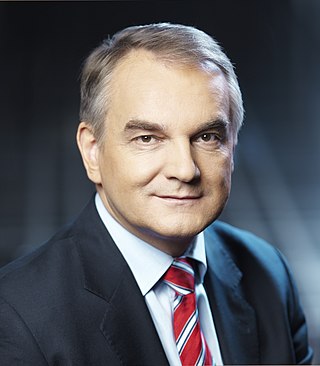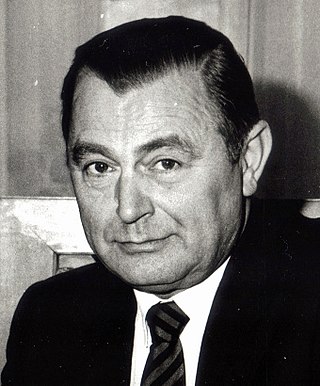| |||||
| Decades: | |||||
|---|---|---|---|---|---|
| See also: | |||||
Events during the year 2003 in Poland.
| |||||
| Decades: | |||||
|---|---|---|---|---|---|
| See also: | |||||
Events during the year 2003 in Poland.

Leszek Cezary Miller is a Polish politician who served as prime minister of Poland from 2001 to 2004. He has served as a Member of the European Parliament (MEP) since July 2019.

Aleksander Kwaśniewski is a Polish politician and journalist. He served as the president of Poland from 1995 to 2005. His tenure as President was marked by modernization of Poland, rapid economic growth, the drafting of a new Polish Constitution (1997), and the accession of Poland to NATO (1999) and the European Union (2004). In 2004, he brokered a pro-democratic agreement during the Orange Revolution in Ukraine.

The Weimar Triangle is a regional alliance of France, Germany, and Poland created in 1991 in the German city of Weimar. The group is intended to promote co-operation between the three countries in cross-border and European issues.

Marek Marian Belka is a Polish professor of economics and politician who has served as Prime Minister of Poland and Finance Minister of Poland in two governments. He is a former director of the International Monetary Fund's (IMF) European Department and former Head of Narodowy Bank Polski. He has served as a Member of the European Parliament (MEP) since July 2019.

The Polish Round Table Talks took place in Warsaw, Poland, from 6 February to 5 April 1989. The government initiated talks with the banned trade union Solidarność and other opposition groups to defuse growing social unrest.

Waldemar Pawlak is a Polish politician. He has twice served as Prime Minister of Poland, briefly in 1992 and again from 1993 to 1995. From November 2007 to November 2012 he served as Deputy Prime Minister and the Minister of Economy. Pawlak remains Poland's youngest prime minister to date.

Wincenty Witos was a Polish statesman, prominent member and leader of the Polish People's Party (PSL), who served three times as the Prime Minister of Poland in the 1920s.

Presidential elections were held in Poland on 8 October 2000. Incumbent President Aleksander Kwaśniewski was easily re-elected in the first round with more than 50% of the vote, the only time a direct presidential election in Poland has not gone to a second round.

Zbigniew Stefan Messner was a Polish communist politician and economist. His ancestors were of German Polish descent who had assimilated into Polish society. In 1972, he became Professor of Karol Adamiecki University of Economics in Katowice. In the 1980s, Messner held numerous high ranking posts within communist party apparatus. He was a member of the Central Committee of the Polish United Workers' Party (PZPR) from 1981 to 1990, when PZPR was dissolved, member of the PZPR Politburo from 1981 to 1988, Deputy Prime Minister from 1983 to 1985, member of Sejm from 1985 to 1989, Prime Minister of Polish People's Republic from 1985 to 1988 and member of the State Council of the Polish People's Republic from 1988 to 1989. Additionally in the 1960s Messner was the chairman of Piast Gliwice football club.

Presidential elections were held in Poland on 5 November 1995, with a second round on 19 November. The leader of Social Democracy, Aleksander Kwaśniewski, and incumbent President Lech Wałęsa advanced to the second round. Kwaśniewski won the election with 52% of the vote in the run-off against 48% for Wałęsa.

Presidential elections were held in Poland on 9 October and 23 October 2005. The outgoing President of Poland, Aleksander Kwaśniewski, had served two five-year terms and was unable to stand for a third term. Lech Kaczyński defeated Donald Tusk to become President of Poland.

The deputy president of the Council of Ministers, colloquially known as the Deputy Prime Minister, is the deputy of the Prime Minister of Poland and a member of the Council of Ministers of the Republic of Poland. They can also be one of the Ministers of the Republic of Poland. The Constitution of the Republic does not limit the number of persons who can hold the position of deputy prime minister simultaneously.
Zbigniew Siemiątkowski is a Polish politician and political scientist. He was Minister of Internal Affairs, 1996–97, and head of the Intelligence Agency, 2002 – April 2004.

Left and Democrats was a centre-left electoral alliance of political parties in Poland which was created on 3 September 2006, before the Warsaw municipal election of 2006. The coalition's aim was to provide an alternative for both Law and Justice and Civic Platform, which have been Poland's two major political parties since 2005. LiD contested their first national election in October, 2007 and won 53 seats to the Polish parliament, the Sejm. The LiD alliance was dissolved in April 2008, following a rift between the member parties.
The Chancellery of the President of the Republic of Poland is an institution that assists the President of Poland with fulfilling his tasks as head of state. The Chancellery is headed with its chief, currently being Grażyna Ignaczak-Bandych.
Stanisław Jakub Fołtyn was a Polish footballer who played as a goalkeeper. He was part of Poland's squad at the 1960 Summer Olympics, but he did not play in any matches.
The following lists events that happened during 2014 in Poland.

Aleksander Wacław Ładoś [alɛ'ksandɛr 'wadoɕ] was a Polish politician and diplomat, who 1940–45 headed the Legation of Poland to Switzerland. Ładoś was a member and de facto leader of the Ładoś Group, also known as Bernese Group, a secret action by the Polish diplomats and Jewish organizations who helped save several hundred Jews from the Holocaust by providing them with illegal Latin American, mostly Paraguayan passports.
Events during the year 2020 in Poland.
Events during the year 1997 in Poland.